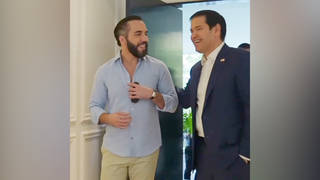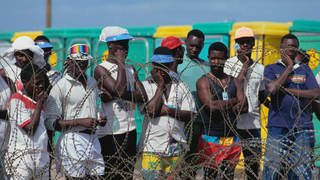HeadlinesApril 19, 2016
New York Voters Head to Polls Today in Closely Watched Primary
Voters in New York are heading to the polls today for one of the most closely watched races of the election. Donald Trump is leading on the Republican side, while Bernie Sanders and Hillary Clinton are locked in an increasingly tight race for the Democratic contest. Sanders has won eight of the last nine contests, but Hillary Clinton enjoys wide support in parts of New York, where she served as a senator for eight years. At least 3 million New Yorkers—27 percent of the state’s population—cannot vote today because they are not registered as either Democrats or Republicans, and are therefore barred from voting in the closed primary. The deadline to switch party affiliation was back in October. Meanwhile, more than 200 New Yorkers who saw their party affiliations mysteriously switched are filing a last-minute lawsuit to try to make today’s primary open. We’ll have more on the New York primary later in the broadcast.
#DemocracyAwakening: 300 Arrested in D.C. to Protest Money in Politics
Meanwhile, more than 300 people were arrested Monday in Washington, D.C., in a mass civil disobedience to protest against the influence of big money and corporate lobbying in politics. Monday’s demonstration, dubbed “Democracy Awakening,” caps a week of massive protests in which about 1,200 people were arrested in total. Among those arrested Monday were NAACP President Cornell William Brooks, Moral Monday organizer Reverend William Barber and Greenpeace USA Director Annie Leonard. To see our interview with Reverend Barber before his arrest, go to democracynow.org.
Hundreds of Refugees Feared Dead After Boat Capsizes in Mediterranean
Hundreds of refugees from Eritrea, Ethiopia and Somalia are feared to have died after their boat capsized in the Mediterranean en route to Italy on Monday. Survivors say that up to 500 people may have drowned, although the reports are still unconfirmed. The number of people trying to cross from Libya to Italy has surged after a controversial new deal took effect in March that calls for all refugees arriving in Greece to be deported to Turkey. Monday’s disaster comes nearly one year after a refugee boat capsized in the Mediterranean on April 19, 2015, killing as many as 800 people. After Monday’s news broke, Doctors Without Borders tweeted: “2016, the Mediterranean is a mass grave.”
Syrian Opposition Quits Peace Talks Amid Assad’s Ceasefire Violations
This comes as the latest round of Syrian peace talks are close to collapse in Geneva, after the opposition pulled out of the formal negotiations in protest of ceasefire violations by Syrian President Bashar al-Assad’s regime and its backers. Senior opposition negotiator Mohammed Alloush spoke out.
Mohammed Alloush: “When there are 70 airstrikes and when there is mobilizing of troops, when Iran sends further armed men and Russia sends a large group of rockets and unmanned planes, all this tells us that there is no real will for a political solution that ensures the safety and stability in the country and ensures transition of political power.”
Afghanistan: Taliban Attack in Kabul Kills 28
In Afghanistan, a Taliban attack in Kabul has killed at least 28 people and wounded more than 300. Afghan officials say the morning rush-hour attack included both a car suicide bomb and multiple gunmen. The majority killed were civilians. After more than 15 years of the U.S. war in Afghanistan, the Taliban currently controls more territory than at any time since the 2001 U.S. invasion.
Ecuador: Death Toll from Earthquake Rises to 413
Ecuadorean officials say the death toll from Saturday’s 7.8-magnitude earthquake has risen to at least 413 people, as first responders continue to search for survivors. Nearby Latin American countries, as well as the Palestinian National Authority, have sent emergency responders. The help from Palestine comes after Ecuador sent humanitarian aid to Gaza following Israel’s 2014 offensive.
Texas Gov. Declares State of Emergency Amid Unprecedented Flooding
Texas Governor Greg Abbott has declared a state of emergency in nine counties after unprecedented flooding killed five people and inundated thousands of homes in the Houston area. More than 20 inches of rainfall were recorded in some areas.
Israeli Police Say 21 Injured in Bomb Explosion on Jerusalem Bus
Israeli police say 21 people were injured after a bomb exploded on a bus in Jerusalem Monday. No one was killed. No one has claimed responsibility for the attack.
L.A. Public School Opens District’s First Gender-Neutral Bathroom
The Los Angeles public high school Santee Education Complex has opened the school district’s first gender-neutral bathroom, following months of student organizing. Student activist Johnny Ramos spoke out about the bathroom’s significance.
Johnny Ramos: “So, this restroom is important so all students can feel comfortable, not just LGBT students or not just minority students. It’s for all students, so everyone could feel welcome. This is our school, and we’re eight hours here. At a certain point in time, we’re going to have to use the restroom. And, you know, it’s just unfair that some of these kids have to hold the restroom, and it honestly sucks.”
This comes amid the passage of anti-transgender laws in North Carolina and Mississippi.
Maryland: Black Trans Woman Keyonna Blakeney Murdered
A 22-year-old black transgender woman has been killed in Montgomery County, Maryland. Keyonna Blakeney was killed Saturday at the Red Roof Inn. Police are investigating her murder. Keyonna is the ninth trans person to be murdered this year.
Chicago: Father Takes Sanctuary in Church to Protect from Deportation
In Chicago, a father of five American children has taken sanctuary in a church to protect himself from deportation. Thirty-four-year-old Jose Juan Federico Moreno has spent seven years fighting deportation after he was convicted of a DUI in 2009. On Monday, Moreno said, “Leaving my children behind is not a choice I can make. … All I am asking for is a chance to see my children grow and support my family.” This comes as the Supreme Court heard arguments in one of the most significant immigration cases in decades. We’ll have more on the Supreme Court case after headlines.
Baltimore Youth Wins Goldman Environmental Prize
In Baltimore, 20-year-old Destiny Watford has become one of the youngest winners of the Goldman Environmental Prize in the award’s history for organizing to stop a trash incinerator from being built in Baltimore’s Curtis Bay neighborhood, which already has the worst air pollution in the city. She began the campaign when she was only 17 years old.
Destiny Watford: “I’ve always been a bit shy. But when I joined the group, I was really challenged to come out of that comfort zone. And I went up to this man’s door, and I told him about the incinerator. He just said, 'What you kids are doing is pointless; Curtis Bay is and always will be a dumping ground, and you're not going to change that.’ And it was a disheartening moment, but it also lit this sort of fire.”
Other 2016 winners of the prestigious environmental prize include a Slovak lawyer who shut down a toxic waste dump, a Cambodian activist who went undercover to expose illegal logging, a Puerto Rican who established a new nature reserve on the island, a Tanzanian man who developed a new way to grant land titles to indigenous communities rather than to individuals, and a Peruvian farmer who fought a gold and copper mine from taking her land.
Pulitzer Prize Awarded to AP Investigation “Seafood from Slaves”
And the 100th annual Pulitzer Prizes have been announced. The Washington Post won for the series “Fatal Force,” which tracked 990 police killings throughout 2015. Lin-Manuel Miranda won best drama for “Hamilton.” Ken Armstrong of The Marshall Project and T. Christian Miller of ProPublica won for the investigation “An Unbelievable Story of Rape,” which chronicles a botched rape investigation. And the Associated Press won the Pulitzer Prize for public service for the investigative series “Seafood from Slaves,” which uncovered slavery in the Southeast Asia fishing industry—a major supplier of seafood to the United States. I sat down with two of the AP reporters, Robin McDowell and Martha Mendoza, last week in Los Angeles.
Amy Goodman: “This issue of third-party suppliers, Martha, what do you say to companies that say, 'We can't be responsible for going right back to the beginning of where a fish is caught. If these men are slaves, certainly we don’t condone that, but how would we know?’”
Martha Mendoza “Well, we’re a couple of moms, we are news reporters, and we found this. I don’t buy it. A major corporation that really cares and is really committed to keeping human trafficking out of their supply chain can get meticulous, get on the ground, talk to people, figure out where their products come from. And it may be a little bit more expensive for them, and their profit margin may be a little smaller, but it’s entirely doable for them to follow their product from the producer right onto their store shelves.”
The Pulitzer Prize to AP went to an all-woman team. To see our full interview with Pulitzer Prize-winning reporters Robin McDowell and Martha Mendoza, go to democracynow.org.
Most popular
- 1
- 2
- 3
- 4
Non-commercial news needs your support
Please do your part today.











Media Options